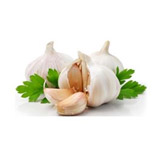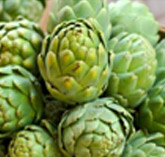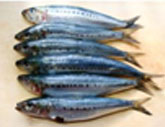
Walnuts
Walnuts are packed with tryptophan, an amino acid your body needs to create the feel-great chemical serotonin. They have higher levels of this natural mood-regulator and are digested slowly, which contributes to mood stability and can help you tolerate stress.”

Asparagus
These spears are one of the best veggie sources of folate, a B vitamin that could help keep you out of a slump. Folate is important for the synthesis of the neurotransmitters dopamine, serotonin, and norepinephrine.

Spring garlic
The slim-you benefit of this seasonal treat lies in a compound called allicin, which gives garlic its pungent smell. Allicin may keep you from overeating by stimulating satiety in the brain.
Spring garlic has a milder, sweeter taste than the dried white bulbs. Enjoy it diced on salad for a fat-fighting side or lunch.

Spinach
These tasty leaves are a great source of iron especially if you don’t eat meat, which is a key component in red blood cells that fuel our muscles with oxygen for energy.
Researchers statesthe compounds found in spinach actually increase the efficiency of our mitochondria, the energy-producing factories inside our cells.

Artichokes
If you’ve been huffing and puffing up the stairs, try these spiky-leafed vegetables. They’re loaded with magnesium, a mineral vital for more than 300 biochemical reactions in the body—including generating energy,About 68% of us aren’t getting enough of this mineral. For women, the goal is 320 milligrams (mg) per day. One medium artichoke provides 77 mg of magnesium (and just 60 calories!). Other top sources include nuts, legumes, and whole grains.

Salmon
Salmon is rich in a fatty acid called eicosapentaenoic acid (EPA), a type of omega-3 that naturally helps block the release of UV-induced enzymes that diminish collagen, causing lines and sagging skin. Omega-3s also regulate oil production in the skin and boost hydration, which helps keep your complexion dewy and acne-free.

Strawberries
They’re loaded with antioxidants that help your skin repair damage caused by environmental factors like pollution and UV rays. Plus, they’re packed with vitamin C (less than a cup gets you your entire 75 mg RDA)—the vitamin associated with fewer wrinkles and less dryness.

Blueberries
Eat them regularly and you may reap big brain benefits. In a recent study, people with age-related memory decline who drank roughly two and a half cups of blueberry juice per day for 12 weeks (the equivalent of eating a cup of blueberries) made significant improvements on memory and learning tests compared with those who drank a placebo juice.
The secret component, a type of antioxidant called anthocyanins have been shown in animal studies to increase signals among brain cells and improve their resilience, enhancing learning and memory.”

Apples
Are extremely rich in important antioxidants, flavonoids, and dietary fiber. The phytonutrients and antioxidants in apples may help reduce the risk of developing cancer, hypertension, diabetes, and heart disease.

Beetroot
Also known simply as the beet, has been gaining in popularity as a new super food due to recent studies claiming that beets and beetroot juice can improve athletic performance, lower blood pressure and increase blood flow.

Sardines
They are one of the most concentrated sources of the omega-3 fatty acids EPA and DHA, which have been found to lower triglycerides and cholesterol levels; one serving (3.25 ounce can) of sardines actually contains over 50% of the daily value for these important nutrients.
A can of sardines, which is equal to about 3.75 ounces, contains 10.53 grams of fat, but only 1.4 grams are saturated. The rest of the fat in a can of sardines is healthy unsaturated fat, which can help lower your cholesterol and reduce your risk of heart disease.

Kale
Is low in calorie, high in fiber and has zero fat. One cup of kale has only 36 calories, 5 grams of fiber and 0 grams of fat. It is great for aiding in digestion and elimination with its great fiber content. It’s also filled with so many nutrients, vitamins, folate and magnesium.

Tuna
Tuna fish has a significant impact on heart health. In terms of reducing coronary heart disease, tuna fish has very high levels of omega-3 fatty acids, which help to reduce omega-6 fatty acids and cholesterol in the arteries and blood vessels.
